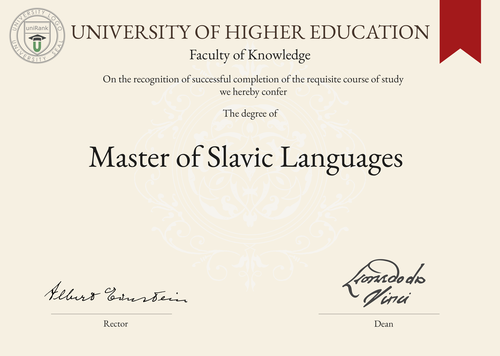
Master of Slavic Languages (M.S.L.)
Guide to Master of Slavic Languages Program/Course/Degree
Master of Slavic Languages (M.S.L.)

Program Name:
Master of Slavic LanguagesProgram or Degree abbreviation:
M.S.L.Duration range:
The duration of the Master of Slavic Languages program typically ranges from 1 to 2 years, depending on the university and country.Tuition range:
Tuition fees for the Master of Slavic Languages program can vary significantly depending on the chosen country and university. It is recommended to check with specific institutions for accurate information.Overview:
The Master of Slavic Languages program is designed to provide students with advanced knowledge and skills in the study of Slavic languages, literature and culture. It offers a comprehensive understanding of the linguistic, literary and cultural aspects of Slavic countries.Curriculum Overview by year:
The curriculum of the Master of Slavic Languages program is structured to cover various aspects of Slavic languages and cultures. The specific courses offered may vary by university, but typically include: Year 1: - Introduction to Slavic Linguistics - Slavic Literature and Literary Theory - Slavic Cultural Studies - Advanced Grammar and Syntax of Slavic Languages Year 2: - Comparative Slavic Linguistics - Slavic Folklore and Mythology - Translation and Interpretation in Slavic Languages - Research Seminar in Slavic StudiesKey Components:
The key components of the Master of Slavic Languages program include in-depth study of Slavic languages, literature, linguistics, cultural studies and research methodologies. Students also gain proficiency in translation and interpretation skills.Career Prospects:
Graduates of the Master of Slavic Languages program can pursue various career paths. Some common career prospects include: - Language Specialist - Translator or Interpreter - Researcher or Academician - Cultural Consultant - International Relations SpecialistSalary Expectations:
Salary expectations for graduates of the Master of Slavic Languages program can vary depending on factors such as job position, location and level of experience. It is advisable to research specific job markets for accurate salary information. For a more accurate understanding of salary expectations, you can utilize the Job Sites Search Engine, from our sister site jobRank, which searches over 4,600 job sites worldwide. Make sure to specify not only the job title but also the country you are interested in.Conclusions:
It is important to note that the duration, tuition fees, curriculum, key components, career prospects and salary expectations of the Master of Slavic Languages program can vary based on the chosen country or location of study, as well as the university. Prospective students are encouraged to explore different universities and countries to find the program that best suits their needs and goals. Visitors interested in pursuing a Master of Slavic Languages degree can use the uniRank World Universities Search Engine to search for institutions offering this specific degree worldwide. This search engine provides a comprehensive database of universities and their programs, allowing individuals to find the right educational opportunity anywhere in the world.World Universities Search Engine
search for Master of Slavic Languages (M.S.L.) and add the Location (country, state etc.) or specific University you are interested in studying at.
Query examples:
- Master of Slavic Languages (M.S.L.) United States
- Master of Slavic Languages (M.S.L.) United Kingdom online
- Master of Slavic Languages (M.S.L.) Australia international students
- Master of Slavic Languages (M.S.L.) University of California
- Master of Slavic Languages (M.S.L.) University of London tuition fees
- Master of Slavic Languages (M.S.L.) University of Sydney scholarships
Share Program/Course
Interesting? Share this program/course/degree info with your friends now.